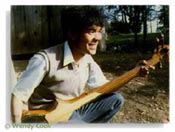|
|
|


| URGENT ACTION NEEDED FOR NGAWANG CHOEPHEL |
 |
Ngawang Choephel has dedicated his adult life to traditional Tibetan
performing arts. In 1992, Ngawang's passion for song and dance earned him
a Fulbright Scholarship to Middlebury College in Vermont, where he studied
western musical notation and film making. During the summer months of 1995,
Ngawang traveled Tibet to utilize his newly gained skills toward documenting
the musical traditions of his occupied homeland. After filming for two
months, Chinese
|
| authorities arrested Ngawang on September 15, 1995. On October 15 1996,
13 months after his arrest, China responded to Senator James Jeffords'
inquiries, confirming Ngawang's detention. They informed the Senator that
Ngawang used the cover of so-called collecting Tibetan folk songs to gather
sensitive intelligence and engaged in illegal separatist activities. Two
and a half months later, on December 26, 1996, China sentenced Ngawang
to 18 years in prison for unnamed "espionage" activities.
Although Ngawang was born in Western Tibet in 1966, he and his mother fled the brutality of the Chinese occupation over the Himalayas, to India when he was but two years old. There, he grew up in a refugee camp in the southern part of the country, and in grade school discovered his enthusiasm for Tibetan Arts. After finishing 10th grade, the Tibetan Institute of Performing Arts (TIPA) in Dharamsala, northern India, accepted him into their three year program. He received his diploma in 1988, and then traveled back to southern India where rejoined his mother and taught music and dance to Tibetan children. In the summer of 1995, Ngawang and an American photographer traveled together for two months to Tibet. During this time, Ngawang gathered 16 hours of video footage of Tibetans performing folk songs and dances. When Ngawang and his companion separated in mid-September, Chinese authorities arrested him in Shigatse. Before his arrest, however, Ngawang gave his videotapes to a western traveler, fearing they would be confiscated if they were found in his possession.
|
By HEATHER STEPHENSON Staff Writer Rutland Herald (Vermont), July 25, 2000 After years of international pressure, China agreed Monday to allow the mother of a former Middlebury College student imprisoned in Tibet to visit him next week. Human rights officials and Vermont's congressional delegation lauded the step, but said China should go further and release prisoner Ngawang Choephel on medical parole. Choephel has suffered from hepatitis, bronchitis and a pulmonary infection while in jail. "We welcome this development and hope the visit goes well," an official at the U.S. State Department said. But, he added, "the U.S. believes that the PRC should immediately release Ngawang Choephel, who is reportedly in poor health." Choephel's mother, Sonam Dekyi, and his uncle, Tsering Wangdu, received their long-awaited travel documents from the Chinese embassy in New Delhi Monday. They plan to take a bus to Nepal today and fly to Lhasa, Tibet, Saturday for a one-week stay. They will be the first people allowed to visit Choephel since his arrest in the late summer of 1995. A former Fulbright scholar at Middlebury, Choephel traveled to his native Tibet to videotape traditional music and dance, but was detained and sentenced to 18 years in jail as an alleged spy. The case has inspired an international outcry, with groups such as Amnesty International calling for Choephel's release. For years, Vermont's congressional delegation and high-level American officials have focused on getting a visa for Dekyi to see her son, because Chinese law allows next-of-kin to visit their imprisoned relatives. Negotiations seemed to stall until about two months ago. Then, in the midst of debate over permanent normal trade relations between China and the United States, the Chinese ambassador to the United States said Dekyi would be allowed to visit her son, said Laurie Schultz Heim, senior legislative assistant to Sen. James Jeffords, R-Vt. It took several weeks for offices in Washington, D.C., Beijing, New Delhi and Lhasa to work out the details, but Schultz Heim praised the result. "We think this is the first time a Tibetan has been allowed into the country to see a family member in prison," she said. Jeffords, who has previously supported normal trade relations with China, opposed making such a trade status permanent this year because of Choephel and threatened to give a long floor speech about the Tibetan case. Schultz Heim suggested that threat was an impetus for China to grant the visa. But others credited the long hard work of negotiations by all of the Vermont delegation and other diplomats over many months. Whatever the cause, Dekyi is excited about the prospect of seeing her son, according to Schultz Heim. She plans to bring him warm clothing, multivitamins and food. She is not permitted to carry any written communication to him and no one but her brother is allowed to accompany her. Advocates for Choephel hope he will realize many people are concerned about him, and that his relatives will be able to learn more about his health. "The data they bring back will be the grist for the mill for the next step in the campaign, which is medical parole," Schultz Heim said. Chinese officials told Dekyi the exact dates that she and her brother would be allowed to travel into and out of Lhasa, and made the plane reservations for them, Schultz Heim said. They also arranged for accommodations in Lhasa for the time Dekyi and her brother are there. Choephel has reportedly been held for the last two years in Powo Tramo prison, 650 kilometers east of Lhasa. Since Chinese officials did not say Dekyi would have to travel there to see him, Western observers are guessing that Choephel will be moved to a prison in Lhasa for the visit. There has been no indication whether Choephel's relatives will be able to see him for only one brief meeting or for extended visits over several days. Those who know Dekyi, a stooped woman in her mid-60s who has lived as a refugee in India for more than 30 years, are worried about how she will respond to the visit, her first trip back to her homeland since she fled on foot in the late 1960s. Over the last five years, she has traveled the world campaigning for her son's release, saying she wants to see him one more time before she dies. "I think Sonam will be grateful to see him. I hope it will provide some relief for her," said Jon Barlow, a friend of Choephel's from Middlebury who now serves as a director of the Sonam Dekyi Fund of Vermont. "I just hope it's not too difficult on her." The fund Barlow directs will cover all the costs of the trip, which Barlow estimated at about $4,000. Dekyi, who has previously refused assistance from the American fund, was thankful that the money was available for the journey, Barlow said. While the visit is important, Mary Beth Markey, director of governmental relations at the International Campaign for Tibet in Washington, D.C., cautioned that it should not be seen as a resting point. "This is an achievement, but the underlying backdrop to all this is very serious and very somber," she said. "When we have Ngawang out, then we can all feel self-satisfied." She is not optimistic that China's acknowledgment of Dekyi's legal right to see her son will lead to his release. "If they could release him to his mother, that would be a beautiful thing," she said. "But I have no reason to expect that that will happen." Barlow hopes the visit will bolster Choephel's morale. "It will be a real boost of confidence for him," he said. "He'll see there has been some serious mobilization on his behalf and that he's not just locked away and forgotten in some remote prison in Tibet, that we are working diligently and continuously to see him released." Vermont's congressional delegation pledged that such work would continue, and said they were watching closely to see if Dekyi is offered a high-quality visit with her son. "I will be anxiously awaiting a full report on her return," said Jeffords in a prepared statement. "I will not stop my activism until Ngawang is free." "As China and the United States strive for better relations, the Chinese Government could go a long way toward advancing that cause by releasing Ngawang Choephel," said Sen. Patrick Leahy, D-Vt., in his prepared statement. "He is no more of a threat than any documentary film maker trying to preserve his culture." Rep. Bernard Sanders, I-Vt., called the case an outrageous violation of human rights. "We have to keep up the pressure," he said. "Hopefully, this is a breakthrough." The press office of the Chinese embassy in Washington, D.C., did not
respond to phone calls seeking comment Monday.
|